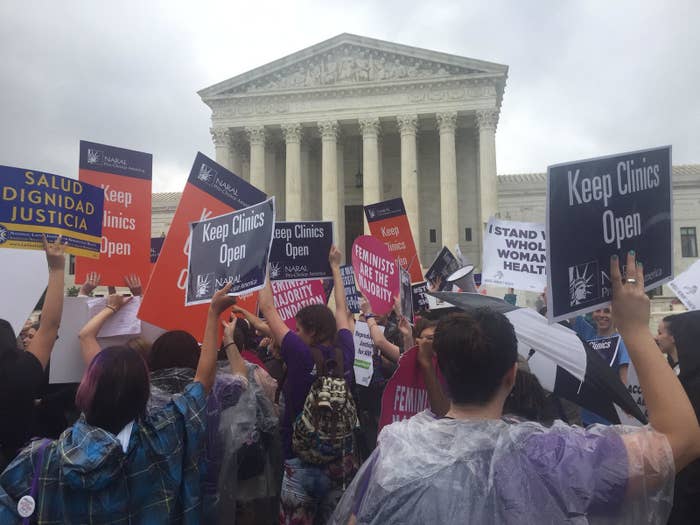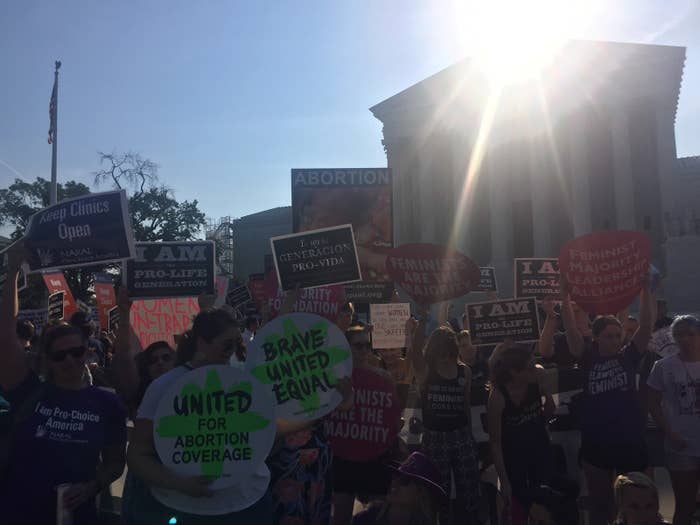
WASHINGTON — The Supreme Court on Thursday struck down two provisions of a Texas law imposing restrictions on abortion providers.
The case, Whole Woman’s Health v. Hellerstedt, addressed how far Texas can go to pass restrictions on abortion providers but ended up providing a strong reaffirmation of a 1992 decision holding that laws imposing an "undue burden" on abortion access are unconstitutional.
At issue was a law Texas passed in 2013 that, among other provisions, requires abortion facilities there to meet the same standards as ambulatory surgical centers (ASCs), where outpatient surgery is performed. Under the new law, doctors who perform abortions also must have admissions privileges at a nearby hospital. Abortion providers and advocates have said the law would result (and has resulted) in many Texas clinics closing because they do not meet standards.
In a 5–3 decision written by Justice Stephen Breyer, the court held that the surgical center requirements and the admitting privileges provisions were unconstitutional.
In considering the case pressed by Texas for the admitting privileges requirement, Breyer wrote, "We have found nothing in Texas’ record evidence that shows that, compared to prior law (which required a 'working arrangement' with a doctor with admitting privileges), the new law advanced Texas’ legitimate interest in protecting women’s health."
Later, he concluded, "[T]he surgical-center requirement, like the admitting-privileges requirement, provides few, if any, health benefits for women, poses a substantial obstacle to women seeking abortions, and constitutes an 'undue burden' on their constitutional right to do so."
Breyer was joined in his decision by Justices Anthony Kennedy, Ruth Bader Ginsburg, Sonia Sotomayor, and Elena Kagan.

Justice Ginsburg wrote a short opinion concurring with Breyer's decision, adding a note that, under current Supreme Court precedent, her view is that "Targeted Regulation of Abortion Providers laws like H. B. 2 that 'do little or nothing for health, but rather strew impediments to abortion,' cannot survive judicial inspection."
Although he wrote nothing in the case, it is notable that Justice Kennedy joined the more liberal justices in striking down the restrictions. Although he formed part of the plurality decision reaffirming the central holding of Roe v. Wade in the 1992 decision, Planned Parenthood of Southeastern Pennsylvania v. Casey, referencing the "undue burden" standard, Kennedy generally has upheld abortion restrictions to have come before the court since then.
Justice Samuel Alito dissented from the court's decision, joined by Chief Justice John Roberts and Clarence Thomas — who also wrote a separate dissent for himself.
The dissenting justices, Alito wrote, believed that the case should have been barred because the plaintiffs had raised the admitting-privileges claim previously and because the second claim, challenging the surgical centers requirement, is closely related. (This barring of claims is called "res judicata.")
Alito went on to write that even if the case was not barred from being brought, the majority was wrong in its decision. In fact, on behalf of the three dissenting justices, he wrote that the court's decision to strike down both provisions would not be correct even if the majority was right that the law imposed an undue burden on access to abortions. Reiterating that he believed the court "is, in fact, wrong on both counts," he stated that the problems found by the majority could have been dealt with in an as-applied challenge — a specific challenge relating to a specific clinic's ability to meet the requirements.
A nine-member court agreed to hear the case this past November, although the justices had, in June 2015, put the appeals court ruling that had upheld the restrictions on hold pending the outcome of the appeals of the case to the Supreme Court.
The oral arguments, which took place on March 2, were one of the first big cases to be considered by the justices after the death of Antonin Scalia. With Scalia gone, it was clear that, at least on this issue, the liberal justices were newly empowered.
